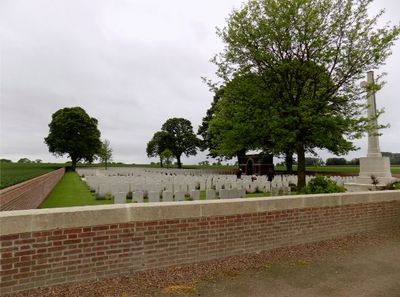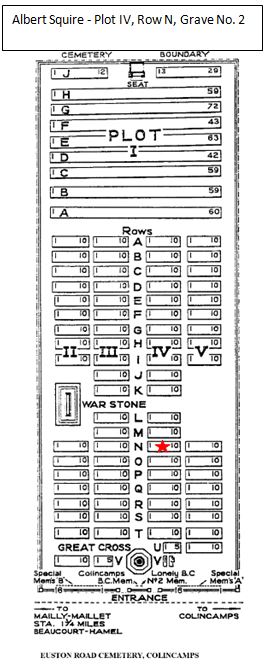Albert Squire
From Our Contribution
 | |
| Personal Information | |
|---|---|
| Date of Birth | Not known |
| Place of Birth | Islington, London, England |
| Death | 5 Apr 1918 |
| Place of Death | Hebuterne, France |
| Age at Enlistment | 40 years, 2 months |
| Occupation | Storeman |
| Religion | Church of England |
| Address | Perth, Western Australia |
| Next of Kin | Niece , Miss Dorothy Squire |
| Military Information | |
| Reg Number | 6879 |
| Date of Enlistment | 6 Mar 1917 |
| Rank | Private |
| Unit/Formation | 28th Battalion, 20th reinforcement transferred to 16th Battalion |
| Date of Embarkation | 29 Jun 1917 ‒ 25 Aug 1917 |
| Ship Embarked On | HMAT A30 Borda Fremantle to Plymouth |
| Fate | KIA 5 Apr 1918 Hebuterne |
| Monument |
Gosnells War Memorial Listed as AE Squires Gosnells Road Board Honour Roll Listed as AE Squires Australian War Museum |
| Medals |
British War Medal Victory Medal |
Contents
[hide]Pre War
Served with the Northamtonshire Regiment in the Boer War.
War Service
Albert entered Blackboy Hill camp on 6 Mar 1917, and on 16 Mar 1917 he was allocated to the 20th reinforcement draft for the 28th Battalion. He embarked in Fremantle aboard HMAT A30 Borda on 29 Jun 1917 for England where on arrival he was sent to the 7th Training Battalion at Rollestone. On 8 Nov 1917 he was transferred to the 6th Training Battalion at Fovant before proceeding overseas to France through Southampton on 23 Jan 1918. After 5 days in the 4th Division's Base Depot in Le Havre, he was taken on strength by the 16th Battalion.
In March 1918 the 16th battalion was moved south from Belgium along with most other Australian units to blunt and stop the German breakthrough that had the British 4th Army in retreat in the Somme valley. They moved several times before reaching their final defensive position south of Hebuterne, about 10 kilometers north of Albert, where they had several battles with the advancing German troops in the week after their arrival. Early on 5 Apr 1918 they were on the receiving end of a savage artillery bombardment that commenced at 6:00am, with lots of gas shells included. At 9:30am, the barrage lifted and an estimated 2,000 German troops attacked the 16th Battalion position in waves. However, this was soon broken up by accurate Lewis gun and rifle fire. Another attempt was made by the German troops around 10:30am, with the same outcome.
The 16th Battalion's losses were nine killed and 28 wounded, compared to many hundreds of German casualties. Sadly, one of the Australia KIA was Albert.
Post War
Notes

